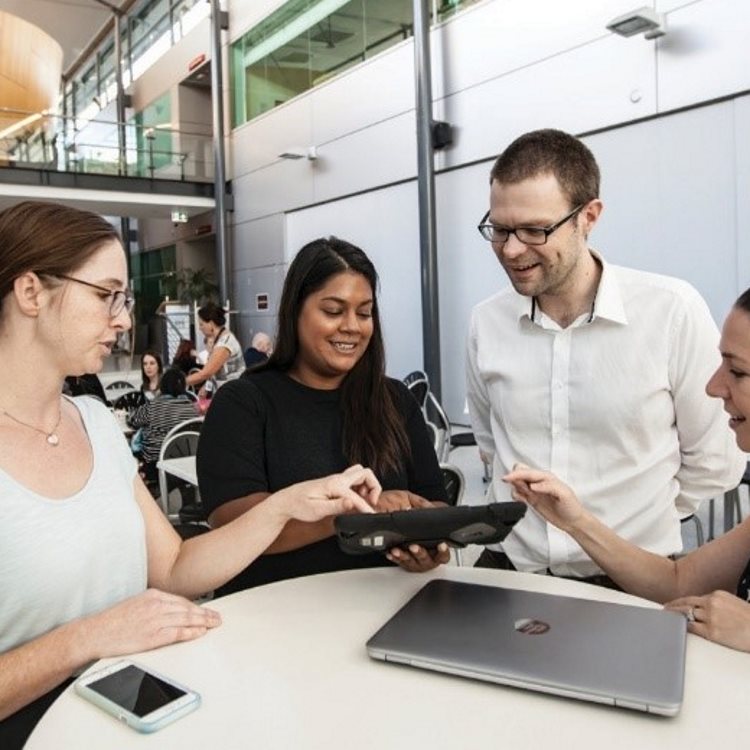Search
Research
Social support helps protects against depressed mood in adolescenceThe goals of the current study were to identify different trajectories of sadness from Grade 6 to 9 in Australian school students, and to explore the role that social support from school, teachers, friends and families play in supporting students’ mental health.

News & Events
Technology powering researchResearchers at The Kids are harnessing the power of apps and other online tools to ensure the results of their research reach those who need it most – children, young people and families.
Research
The Nutritional Quality of Kids’ Menus from Cafés and Restaurants: An Australian Cross‐Sectional StudyAustralian families increasingly rely on eating foods from outside the home, which in-creases intake of energy‐dense nutrient‐poor foods. ‘Kids’ Menus’ are designed to appeal to families and typically lack healthy options. However, the nutritional quality of Kids’ Menus from cafes and full‐service restaurants (as opposed to fast‐food outlets) has not been investigated in Australia. The aim of this study was to evaluate the nutritional quality of Kids’ Menus in restaurants and cafés in metropolitan Perth, Western Australia.
Research
The built environment and early childhood development: qualitative evidence from disadvantaged Australian communitiesThis paper explores neighborhood-built environment features related to ‘better than expected’ and ‘as expected’ early childhood development outcomes (ECD) in 14 Australian disadvantaged communities. This paper draws from mixed methods data collected in the Kids in Communities Study–an Australian investigation of community effects on ECD–in communities across five states and territories.
Research
Measuring early childhood development with The Early Human Capability Index (eHCI): a reliability and validity study in ChinaWith the importance of early childhood development more recognized by the international society, low-cost and cross-culturally comparable measures of early childhood development is in great demand, both in China and worldwide. In this study, we aim to test the psychometrics of the Chinese version of The Early Human Capability Index (eHCI), which is designed as a measurement for school readiness in large population.
Research
Gender differences in time allocation contribute to differences in developmental outcomes in children and adolescentsUsing over 50 thousand time-use diaries from two cohorts of children, we document significant gender differences in time allocation in the first 16 years in life. Relative to males, females spend more time on personal care, chores and educational activities and less time on physical and media related activities. These gender gaps in time allocation appear at very young ages and widen overtime.
Research
Prevalence of breakfast skipping among children and adolescents: a cross-sectional population level studyInterventions to promote breakfast consumption are a popular strategy to address early life inequalities. It is important to understand the epidemiology of children and adolescents who skip breakfast so that interventions and policy can be appropriately considered.
Research
A psychometric evaluation of the Connor–Davidson Resilience Scale for Australian Aboriginal youthThere is a paucity of quantitative measures of resilience specifically validated for young Aboriginal people in Australia. We undertook the first investigation of validity and reliability of the Connor-Davidson Resilience Scale in a sample of Australian Aboriginal people, with a focus on youth. We conducted a cross-sectional study of resilience among a sample of 122 Aboriginal youth (15–25 years old) in New South Wales and Western Australia, featuring self-completes of the 10-item CD-RISC in online (N = 22) and face-to-face (N = 100) settings.
Research
Investment in child and adolescent health and development: key messages from Disease Control Priorities, 3rd EditionThe realisation of human potential for development requires age-specific investment throughout the 8000 days of childhood and adolescence.
Research
Early childhood education and child development in four countries in East Asia and the PacificResults indicate that early childhood education is beneficial for children's early development
